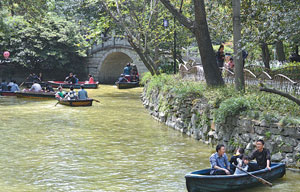Tourism, cultural heritage to help boost soft power
In retrospect, it wasn't a good idea to watch that Liam Neeson movie in which his plane crashes in the Alaskan wilderness and he finds himself with a bunch of oil-rig roughnecks trying to fight off hungry wolves. Gory bits of the film flashed through my mind the next morning during our flight to Chengdu. Every time we experienced turbulence, I closed my eyes and tried to think of the giant pandas.

Group travel had never been our idea of fun, but with three days off from work in Beijing during Spring Festival and no time to plan ahead, a China Culture Center tour of Sichuan province seemed like a wise move, and before you could say "hot, spicy food", we were sitting on a bus in Chengdu.
The guided tour proved to be a shining example of the power of cultural tourism to transcend language difficulties and stimulate our interest in the people and history of China. Pandas are the ultimate use of soft power, of course, and a visit to the reserve was a highlight. The Sichuan Opera performances and the Sanxingdui Museum containing artifacts from the Shu people were wonderful, too.
"You'll see people drinking tea and playing mahjong in Chengdu," a Chinese colleague predicted.
He was right. We ambled around the restored alleys, and soon we were sitting beneath a white fig tree, sipping jasmine tea, watching people dancing in the park. A woman in a fur-trimmed coat sashayed down a red carpet, watched by three generations of a Chinese family. In such a relaxed atmosphere, we marveled at the harmony of it all.
Back in Boston in 1972, my family's knowledge of modern China was confined to grainy TV images and even grainier newspaper photos of Richard Nixon shaking hands with Mao Zedong and toasting Zhou Enlai as Henry Kissinger beamed. In a house full of books, we had only one novel about China: The Good Earth, by Pearl Buck, the daughter of missionaries who became the first American woman to win the Nobel Prize in literature.
A trip to Chengdu was beyond the reach of my late parents, whose lives centered on what used to be called the pursuit of the American Dream. And here I was, wearing an orange life-vest, bobbing down the river in one of many boats jostling for a view of the Giant Buddha of Leshan, the largest stone Buddha in the world.
In Ireland, where I lived for 25 years, there is an awareness of cultural tourism as a powerful force. Ireland, a small, beautiful country of 4.6 million people on the periphery of Europe, is a great literary culture. It is the land of James Joyce, W.B. Yeats and the contemporary poet Seamus Heaney. Literature is in the air there. Over the years the Irish played to their strengths and created literary, music and drama festivals, held all year round, which attract many discerning visitors.
Despite its distinction in the arts, Ireland, throughout most of its long, hard history, was unable to provide enough jobs for its people, except during the boom years known as the Celtic Tiger. There was mass emigration after the Great Famine in the mid-19th century, when my ancestors left, and there has been wave after wave of emigration since. When the eurozone crisis hit and Beijing came calling, I joined the ever-growing number of "Vanishing Irish". Along with a love of literature, I inherited the emigrant gene.
What seemed an occasion for grief - leaving home, friends and an ailing but beloved newspaper - turned into the experience of a lifetime and a bird's-eye view of China's opening-up. China is a different dimension. The scale of human achievement in so many fields is astonishing. Chinese cultural tourism, particularly to less accessible places, is as fascinating as any we have encountered. It should continue to be supported so that travelers and expatriates can develop a deeper understanding of China.
Sheila Sullivan is assistant director of the International Department at China Daily.






















